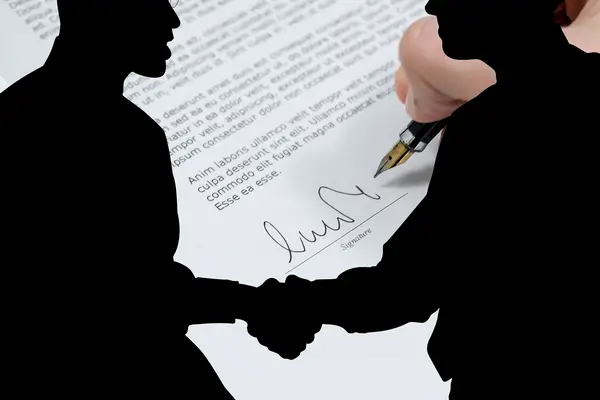
Whilst it’s rare for seller to fail to complete a contract for the sale of a house, it is more common for buyers to not complete. But what happens if you don’t complete after exchange of contracts? Let’s take a look…
What happens if you don’t complete after exchange of contracts? If you don’t complete after exchange of contracts you will be in breach of contract. The seller has the option to rescind the contract after serving a notice to complete the contract. If the contract is then not completed, the buyer may forfeit their deposit. The seller can take legal action to enforce the contract.
Please also read this article to discover how you could save £71,475 on your next mortgage if you sell your house and rent before buying again. Even I was amazed when I did the calculations!
What happens if you change your mind after exchange of contracts in more detail?
The exchange of contracts on the sale or purchase of any property in the UK means that you’re entering into a legally binding contract.
But if you don’t complete after you exchange contracts, which means that you’ve failed to complete the purchase of your new home on the agreed completion date, you could end up in a whole heap of trouble and additional costs.
Most contracts for purchasing a house in the UK have standard conditions included in the contract. Within the standard contract it usually includes a clause whereby if the buyer fails to complete, after having served a notice to complete, the seller may rescind the contract.
If the seller invokes this clause, the buyer may forfeit their deposit. But also any accrued interest. Both of which will be paid to the seller.
What happens if the seller fails to complete on the completion date?
It’s very rare for a seller to exchange contracts and then deliberately fail to complete a sale. This is because most cases sellers want to sell. But what happens if a seller pulls out after exchange of contracts.
Whilst rare, this does happen as sellers can and do sometimes change their mind. What may happen is the seller is offered a significantly higher offer for the house.
Or their could simply be a change in their personal circumstances, which means they no longer wish to sell.
Options if the seller fails to complete on the completion date:
- Walk away and take back the deposit: This option is very simple and avoids spending money on solicitors costs. Plus it avoids any unnecessary stress and anxiety going through the slow UK court system. But of course before you walk away, speak with your solicitor and take advice.
- Pursue the seller for loss and damages: In any event you should be entitle to your loss of costs. Which would include solicitors fees, valuation fees etc. You would have to go to court to claim these from the buyer. But of course there’s no guarantee you’ll get these costs. Plus be aware that if you pay out for additional solicitors fees to go to court, these additional fees may well be lost. Be careful to not throw good money after bad. Always take legal advice when it comes to these types of situation.
- Serve a notice to complete: Most standard contracts include a clause to provide for a notice to complete where one party has failed to complete the contract. The effect of this notice is that it requires the other party to complete the transaction, which his usually within ten working days.
- Register a unilateral notice at the Land Registry: In addition to serving the notice to complete, the buyer should ask their solicitor to register a unilateral notice at the Land Registry. This notice gives notice to any potential alternative purchaser of the existence of you as the purchaser. It marks the property as someone else as having an interest in the property. This notice will stop the transfer of the property to another purchaser from being registered at the land registry. The only way for this notice can be removed is if the buyer consents to its removal.
More Reading: What can go wrong between exchange and completion?
What happens if notice to complete is served by the buyer?
It is always good to try and encourage the seller to play ball first, before involving an extra legal costs and fees.
But if the seller is still unwilling to complete the contract voluntarily, the buyer’s solicitor can apply to court for specific performance of the notice. This can be done on the expiry of the period of the notice to complete, which is usually 10 days.
An award for remedy in this situation is at the discretion or the court. This is because it is an equitable remedy and is not available as of right.
The court has the power to decide whether or not damages are a more appropriate remedy rather than specific performance of the contract; i.e. forcing the seller to sell the house to you.
The court would consider the following circumstances when making their decision:
- The seller is unable to give ‘good title‘ to the property.
- Does the award cause exceptional hardship to the seller. But the threshold for hardship is high and is not necessarily awarded
- It’s discovered there was fraud or another illegality involved in the transaction.
- There has been a genuine mistake.
- One of the parties lacks capacity making it difficult of impossible to enforce the contract.
- It’s discovered a third party has an interest in the property.
- Where there has been undue delay, which doesn’t have to be the fault of either party specifically.
- Or where the court deems that damages would be an adequate remedy in the circumstances.
But outside of the above remedies, and because a contract for the sale of an interest in land is generally enforceable in the UK, the award of damages are not usually adequate for a buyer.
But be aware that just because you win in court and the judge awards in your favour, this isn’t the end of the matter. You still need to remove the seller out of the house. If the seller refuses to leave the property, you can obtain an order for their removal.
This order should contain a penal notice. This means the seller would be held in contempt of court. A penal notice carries a prison sentence and they could also be fined if they fail to comply.
More Reading: What can go wrong between exchange and completion?
What happens if a buyer pulls out after exchange of contracts in the UK?
If your buyer pulls out after exchange of contracts it’s very likely they will lose their deposit, which is normally 10% of the purchase price.
As the seller you can also sue the buyer for any loss this has caused, including any losses incurred if you fail to sell your house for what the buyer contracted to buy it at.
In most cases where there’s been a failure by one party or another to complete on a contract for the sale or purchase of a property in the UK. This normally arises due to the buyer’s default rather than on account of the seller.
Often times this is because the buyer has been unable to obtain suitable mortgage funding for the purchase. Or it can happen where the mortgage company has withdraw their mortgage offer between exchange and completion.
Another reason why a buyer may pull out from a purchase is if they feel they property has gone down in value. Neither reason is a valid one to renege on the contract, as the contract is binding and enforceable.
But what are the remedies for the seller if a buyer doesn’t complete after exchange of contracts?
Remedies for the seller if a buyer pulls out after a failed completion:
- The seller could keep the deposit and re-sell the house: This is my preferred option if this were to happen to me. You are already ahead of the game, as you have 10% off the asking price in the bank, then you sell the house again for full asking price. The only time when this isn’t a benefit is when the value of your house has fallen more than the amount of the deposit held. But in a static property market or in an upward trending market, you won’t suffer any loss. But instead you’ll have gained. This option avoids unnecessary legal costs and stress of going through the very slow UK courts system.
- The seller is entitled to damages in addition to the deposit: In a stable market or an upward trending property market it’s unlikely there would be an award for damages. In a case involving Hooper v Oates, the seller was awarded damages of £110,000. This was as a result of the buyer failing to complete on a purchase at the time for £605,000, which was later only worth £495,000. The seller was awarded £49,500, which is the award less the original deposit of £60,500.
What happens if completion is delayed?
If instead of a failed completion there is a delay in completion, what happens then? Any delay beyond the agreed completion date is a breach of contract.
When a delay happens, the amount of compensation to the ‘damaged’ party(ies) can depend on the length of the delay, but the contract will include clauses to deal with the remedy in this case.
This could include liability for interest which will usually accrue on a daily basis. The rate of interest will be calculated in accordance with the terms of the contract.
As noted above, and in order to protect the seller’s interests, a notice to complete should be served. As explained above, this notice provides for an extra 10 working days to allow completion to be effected.
But this time limit is not negotiable, as it will be included as a term within the contract.
Buyers should be aware that should completion not be effected within the 10-day notice period, the seller has the right to rescind the contract. The seller will be entitled to keep the 10% deposit and sell the property elsewhere.
Please don’t forget to read this before you leave…
Please don’t forget to also read this article to discover how you could save £71,475 on your next mortgage if you sell your house and rent before buying again. As I said earlier, even I was amazed when I did the calculations!
I hope this article has helped on what happens if you don’t complete after exchange of contracts
If this article has helped about “what happens if you don’t complete after exchange of contracts” please share it on your favourite social media site.
Also, if you have any questions, please feel free to comment below too. Alternatively, if you need more help, please feel free to contact us on our contact us page here. Or join the discussion and ask your question in the property forum.





What this article fails to mention and what I unfortunately experienced first hand is if your house sale/purchase is part of a chain and your buyer doesn’t/can’t complete after exchange then you are also in breach of your contract through no fault of your own. You forfeit your deposit (which unless downsizing is more than the buyers), are forced to sell at a lower price to secure a quick sale and avoid being pursed by the seller for (unlimited) associated loses and as most estate agents fees are due on exchange not completion are liable for paying those twice too and that’s before the additional conveyancing and litigation solicitor fees. The house buying system needs to be amended, it’s not good enough to say these are rare cases. In the eyes of the law we were treated identically (well worse because we had our house as an asset) to the first time buyer who committed fraud and had their mortgage withdrawn after exchange due to information being withheld.
Hi and thank you for your comment. I’m sorry to learn of your bad experience and this is a welcome addition to the article and well worth knowing too. Please share what ended up happening in this case, as it looks like you lost your deposit, but I assume a part of your loss was covered by the deposit you received on your house? I agree there needs to be some sort of change to the system.
After much stress and legal advice including from Counsel due to it being such an unusual circumstance we were able to move into the house we originally planned to purchase (a vacant renovation project, which until immediately prior to going on the market was operating as an illegal HMO). Luckily the chain only consisted of the 3 parties. We lost most of our deposit although the uplift between the 10% of our buyers deposit and the 10% of the property we purchased wasn’t asked for in the end, as we managed to complete before an agreed extended deadline for completion, however this meant dropping the price of our property substantially and paying estate agent and removal fees for a 2nd time plus extra conveyancing and litigation legal costs. We are attempting to reclaim these additional losses although have been met with no response to Letters Before Action and are unsure currently whether it’s worth paying the legal costs to pursue through the courts as it is believed the original buyer has no realistic means of paying/assets given he was first-time buyer in rented accommodation, asking for 90% mortgage.
Hello and thank you for the additional comment. I’m pleased you were at least able to move to your new property, albeit with the extra costs. I think with your claim against your purchaser you may end up throwing good money after bad on this one. It will be annoying as they will have got away with it, although they lost their deposit. It looks like you might be entitled to claim the loss from your buyer due to the drop in price of your house, but if they have no means to pay this, you’ll suffer more costs. Do you have any advice to my other readers on this point to add please…I did look to see if there is insurance to cover this eventuality, and so far I can’t find if this is available. You can get insurance to cover for loss of legal fees due to a failed exchange I know that, but to cover for a lost deposit doesn’t seem to be a type of insurance that’s offered. Whilst this is no consolation to you, it seems as through you were one of the 0.1% of the unlucky ones, as I’m led to believe that in 99.9% of house purchases, they proceed as they should to completion.
Not a lot to add really as a rare situation for a sale to fail to complete after exchange and even rarer for the buyer to be unwilling/unable to complete at all. Usually it’s just a matter of providing additional reassurance and evidence to reinstate a withdrawn mortgage offer or going to a different broker in the case of unemployment etc. but in this circumstance the buyer had no way of purchasing without a mortgage and no way of securing a mortgage. Legally, we are fully justified to claim all the additional expenses as a breach of contract occurred however the inability to pay is what would result in throwing good money after bad and it just becomes a matter of principle (why should the person fully to blame be allowed to get away it / only lose their deposit?). In terms of insurance, we had failed completion legal cover which meant the conveyancing fees for the 1st sale were limited to a £100 excess and our home insurance inc. legal cover (purchased at the point of exchange) covered from when we had moved in and could quantify the extent of loss to prepare a money claim for the courts. That will cover the court and legal costs going forward but only if the case is deemed likely to succeed, i.e. the monies owed are able to be paid, something which is currently being investigated and decided upon by the insurance company via asset searches/credit checks etc. This has been further delayed due to COVID-19 but we have been moved in for 6 months now! I have come to the conclusion now that anything we do get back will be a bonus, whereas at the beginning of the process we thought as an innocent party with reasonably incurred costs we wouldn’t end up out of pocket. In any case being moved in to the property we wanted with no-one pursuing us for loses is the preferable situation/solution. The key things to take out of this are – all is not clear cut after exchanging, exchange and completion on the same day may be a good option (we chose to do this on the actual moving day), it is worth checking if your estate agent fees are payable on exchange or completion, selling to first-time buyers is not always a good prospect and it’s useful to have solicitors that you can meet with face-to-face.
Hi, and thank you once again for engaging with my blog. I wish you all the luck if you do proceed. And please do come back to let me know how it turns out and if anything comes of your claim via the insurance company. Take care and stay safe!